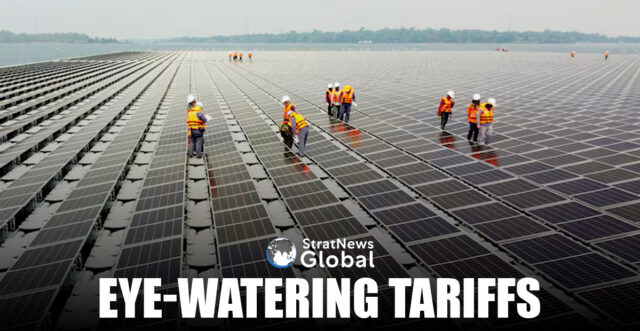U.S. trade officials have set high tariffs on most solar cells from Southeast Asia. This is an important step in ending a year-long case where American companies said Chinese firms were selling solar products at unfairly low prices.
The case was brought last year by Korea’s Hanwha Qcells, Arizona-based First Solar Inc and several smaller producers seeking to protect billions of dollars in investments in U.S. solar manufacturing.
The petitioner group, the American Alliance for Solar Manufacturing Trade Committee, accused big Chinese solar panel makers with factories in Malaysia, Cambodia, Thailand and Vietnam of shipping panels priced below their cost of production and of receiving unfair subsidies that make American goods uncompetitive.
Sky-High Tariffs
The tariffs unveiled on Monday vary widely depending on the company and country, but were broadly higher than the preliminary duties announced late last year.
Combined dumping and countervailing duties on Jinko Solar products from Malaysia were among the lowest at 41.56%. Rival Trina Solar’s products from its operations in Thailand face tariffs of 375.19%.
Neither Jinko nor Trina were immediately available for comment.
Products from Cambodia would face duties of more than 3,500% because its producers elected not to cooperate with the U.S. probe.
Dramatic Shift
“These are very strong results,” Tim Brightbill, an attorney for the U.S. manufacturing group, said on a call with reporters. “We are confident that they will address the unfair trade practices of the Chinese-owned companies in these four countries, which have been injuring the U.S. solar manufacturing industry for far too long.”
The threat of tariffs on countries that supplied more than $10 billion of solar products to the United States last year, accounting for the vast majority of domestic supplies, has caused a dramatic shift in the global solar trade. Imports from the four targeted countries this year are a fraction of what they were a year ago, while shipments of panels from nations like Laos and Indonesia are on the rise.
Critics of the effort, including the Solar Energy Industries Association (SEIA) trade group, have said tariffs would harm U.S. solar producers because they would raise prices on the imported cells that are assembled into panels by American factories. Those facilities have been on the rise since a new subsidy for clean energy manufacturing was created in 2022.
SEIA officials were not immediately available for comment.
In order for the tariffs to be finalized, the International Trade Commission must vote in June on whether the industry was materially harmed by the dumped and subsidized imports.
(With inputs from Reuters)





